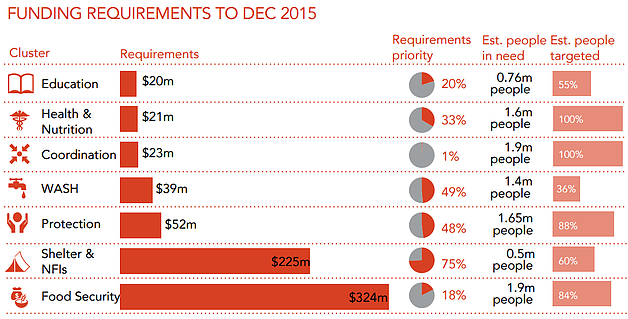2015 Strategic Response Plan launched
1.6 million vulnerable Palestinians targeted for assistance
The 2015 Strategic Response Plan (SRP) represents the humanitarian community’s coordinated plan to respond to the most urgent humanitarian needs in the oPt. Following its global launch in Geneva in December 2014, the SRP was presented locally (in Ramallah) on 12 February by the Deputy Prime Minister of the State of Palestine and the Humanitarian Coordinator and presented to diplomats, the media, UN agencies, and national and international NGOs.
This year’s plan presents a strategy budgeted at $705 million to implement 207 projects presented by 77 organizations, including 64 national and international NGOs and 13 UN agencies. The plan is one of the largest ever launched for the oPt since the first plan formulated in 2003, and requests 80 per cent more funding compared to the $390 million appeal originally launched for 2014 before needs were scaled up as a result of the July-August conflict in Gaza. Over 75 per cent of project requirements in 2015 are related to Gaza.
Via these SRP projects, humanitarians seek to assist 1.6 million of the most vulnerable Palestinians, 1.3 million of whom live in the Gaza Strip, and 0.3 million in the West Bank, including East Jerusalem.
The plan’s aims include:
- Enhancing protection by promoting respect for (International Humanitarian Law) and IHRL (International Human Rights Law), pursuing accountability, and preventing and mitigating the impact of violations;
- Responding to immediate needs following shocks and increasing the resilience of those at risk of forcible displacement;
- Responding to food insecurity and promoting resilient livelihoods;
- Ensuring people have access to essential services;
- Enhancing the capacity of national stakeholders to prepare and respond to emergencies;
- Ensuring transitional solutions for IDPs and those vulnerable to (re-) displacement in Gaza, while working towards a durable solution.

Almost 80 per cent of the requested funding is to provide shelter, non-food items and food assistance to vulnerable Palestinians. In addition, the SRP continues to have a strong protection focus, for instance to prevent and respond to arrests, demolitions, and the discriminatory planning and zoning regime in Area C through legal and advocacy measures.
The SRP will focus on interventions such as repairing homes with minor damage or providing rental cash to the displaced in Gaza; providing post-demolition assistance to families in the West Bank; increasing access to water, sanitation and health services; providing food assistance; supporting rural farmers, herders, breeders, and fishermen; urban and peri-urban producers; monitoring and documenting violations of international humanitarian and human rights law, providing legal assistance and coordinated advocacy; and providing a protective presence during the school commute for pupils in Area C and East Jerusalem.
While the focus of humanitarian work remains largely the same as in previous years, there has been a sharp increase in humanitarian needs in the Gaza Strip, where some 100,000 people remain internally displaced following 51 days of conflict last summer.
Humanitarian assistance is vital in the context of continuing occupation, Palestinian governance issues, and the lack of a political solution. Early funding for SRP interventions is needed to mitigate the worst impact of over seven years of Israeli-imposed blockade, compounded by the Egyptian closure of crossings and tunnels, plus last summer’s hostilities in Gaza. The SRP seeks to counter the most pressing effects of these factors and complements longer term strategies such as the Government’s Early Recovery and Reconstruction Plan for Gaza.









